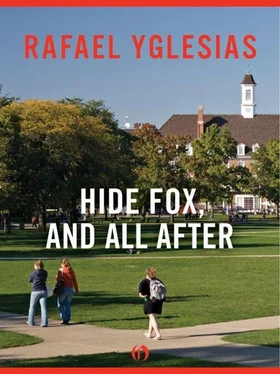Alec smiled, returning his attention to the radio. From the kitchen, Richard’s voice rose in one antagonized phrase. Over that was his mother’s — calm, persuading, reasonable. Seductively sure of victory, she taunted, forgave, accused, threatened, relaxed into reason.
“Politics is mad. Could Marx have dreamed his work would need so much revision? Alec, listen.”
Alec turned to him.
“It’s a common idea of my father’s…that’s absurd, it’s not only my father’s idea. One of the basic ideas of art is political art. Not political, but social art. For example, Balzac was reactionary. But no one murders the middle class the way he does, no one. So art, everyone begins to say, must be social to be great. But, in order to maintain that, they become pretty vague. Joyce is social, though he threw away politics. He’s writing about the middle class in Ireland. Everything will get thrown into that bag: Dubliners, Portrait of the Artist as a Young Man, Ulysses, Finnegans Wake, every fucking one of them. Kafka is political: his novels are about middle-class psychosis. It didn’t matter how reactionary Dostoevsky was, his novels all show class struggles. But all this is obvious. As long as a novel is about life in some time, some definite period, it must be about some class, because there’ve always been class struggles, and since it’s about some class, it’s social, and because it’s social, it’s political, and now you can relax and say it’s great art. Okay. But we’ve still got a little problem. What do you say about Beckett? There’s no definite time, or society, so essentially there isn’t a class. Okay, so what do you say about this? Dad has a simple solution — Beckett isn’t great.”
Alec laughed.
“But it doesn’t work. So you speak to someone else. Someone who believes great art must be political and believes that Beckett is great. So they’ll say, ‘Beckett isn’t located anywhere, just the way Kafka isn’t,’ but he’s still writing about middle-class neurosis.”
There was a bang.
“What’s that?”
They both listened carefully. They could hear someone dialing.
“Richard’s calling somebody,” Alec said. “Probably Stephie.”
“Oh. So what was I saying? Oh yeah, but anyone who knew a fuck about Beckett would say that he is writing about all man for all time. Those groups of idiots that are trying to extend communism to all art hate philosophy. They’re right to, but when they give their line on it, they’ll be cut short. Beckett isn’t presenting a philosophy, he’s presenting a situation. The condition of man, not a unifying, universal concept. So they’ll leap on that. All right, the condition of man. That’s class struggle, and that’s social…etc. This just becomes a farce. Why didn’t they leave it alone? What the hell are they trying to do by making it a universal concept? Making communism a philosophy is absurd. The existence of a perfect communism would allow fantastic developments, sure, but not because of its nature as a system. It allows them because it negates the evils, the restrictions of capitalism. Anyway, we get fucked right into socialist realism. Why, for God’s sake, the first realists, the best realists, were bourgeois. That egotism drives me mad.”
“I don’t think you should…”
Richard appeared at the doorway, cutting Alec short. He looked thoroughly beaten.
“You look miserable,” Raul said. “What happened?”
“A million things.”
Raul and Alec laughed. Alec said, “A little more specifically, what happened?”
“Well, besides taking Stephie to the dentist, I have to drive her to the hairdresser. She was complaining about everything.”
“To the hairdresser,” Raul said. “What is that to do with it?”
“I don’t know. I feel terrible. I have to wash up,” Richard said in a monotone. He walked out without energy, his head bowed.
“He looked clean to me,” Raul said.
“He’s probably going to vomit.”
Raul swiveled his chair to face Alec. “How old is Stephie?”
“Richard’s age. Eighteen.”
“Richard’s age! How could that be?”
“What do you mean, how could that be? They were born the same year.”
“Are they twins?”
“Twins? What? Oh. Oh, you thought…oh no. Stephie isn’t Richard’s sister.”
“Then why did his mother say, ‘Your sister’s driving me mad’?”
“It was just general lamenting. Stephie is Richard’s girl friend.”
“I see.” Raul scratched his hair. “What were you going to say before Richard came in?”
Alec stopped to think. “Oh yeah. I was going to say you should stay out of politics. That it doesn’t go well with art.”
“It’s true you can’t go in for political organization and produce art; but I wouldn’t want to be producing art in America without it being political.”
“Why?”
“We’re living in a country that carries on the most extensive imperialism in history. That must have some kind of an effect on its people. One must have a political viewpoint to deal with Americans as characters. Very soon, everyone is going to be forced into a commitment, and if you’re going to be writing about them, it’s important, even in the smallest way, to have politics in it.”
“Not in the theater.”
“In the theater, I don’t know. There have been political plays, but what I was thinking about in writing was that the cultural forces should be revealed. You’d have to write about people who were up to their necks in politics to have it carry the necessary emotional weight.”
“That’s right. All I was trying to say is that, well, getting involved with the power struggles in S.D.S. can be destructive for an artist.”
“Oh, absolutely. Boy, do I agree with that. Hey, Alec.”
“Ayea.”
“What the hell happened to Richard?”
“Good point.” Alec got up and went out of the room, calling for Richard. Presently he returned. “He’s speaking to Stephie again.”
“That must add up in phone bills.”
“I’ll tell ya something really funny. Stephie lives across the hall.”
“What? Then why the hell is he calling her?”
Alec shrugged. “I don’t know. She’s probably not home.”
“Romance in Riverdale. What time do you think it is?”
“Eleven.”
They sat stupidly for a while. The sun was out now, streaming peacefully through the windows. Raul, all in black, baked; he stretched and yawned, beginning to feel his lack of sleep. Alec stared ahead of him, bored, methodically smoking. Very suddenly, Richard came in, saying, “Let’s go,” and rushed out.
Slowly Raul and Alec lifted themselves up, Raul saying between yawns, madly, for Richard wasn’t there, “Nice chatting with you in your house, Richard.”
Richard, Alec, and Raul, coming out the back way to the parking lot, could see Mother Bloom, her long, Russian-style coat blossoming in the wind, standing impatiently by the white Buick Electra.
“Hurry up, Richard, or I’ll be late.”
Richard didn’t reply. He got in, turned the ignition on.
Alec called, “Should we get in the back?”
“Yeah.”
Raul and Alec climbed in. Mother Bloom took a Nicoban from the glove compartment and said, “It might rain.”
Richard, with a burst of air, got in, saying, “It won’t rain.”
Alec lit a Tareyton between his bloodless lips. “It can’t rain.”
Raul, blinking like an old mole out in the sun, said, “It would be naughty.”
They lurched down winding hill roads, Richard driving with vengeance. Mother Bloom stared ahead; Alec watched the road out the window, squinting from the force of the wind against his face; Raul felt pain in every fiber.
“Go slower, Richard,” his mother said. “Your father wants this car in decent shape when he returns.”
Читать дальше











